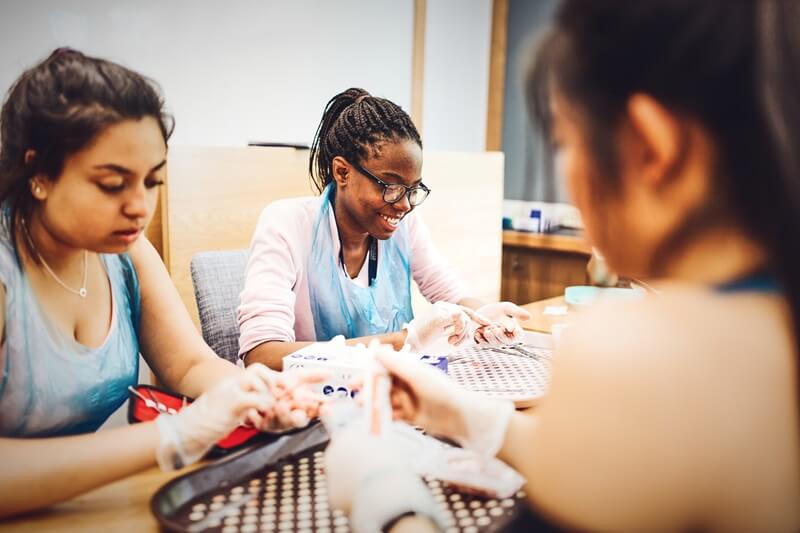Independent learning is a method or process of learning that gives students ownership and control over their own growth. The student who independently learns controls, oversees, and assesses their own learning process. The knowledge they gain from this informs further growth and direction.
The self-directed learner has the freedom to establish objectives, and decide how to meet their educational, social and emotional needs. Additionally, the independent learner assumes responsibility for planning and carrying out their education. They’ll keep track of their progress toward achieving their educational objectives, and self-evaluating the results of the learning process.
Having a well-developed lesson and supporting resources are all essential aspects of teaching, but fostering independent learning in the classroom tends to be more of a process. In this piece, we’ll take a look at how you can start building a classroom climate where independent learning skills can grow, as well as looking at the fruits of helping students to become independent learners.
Independent learning: How can we help pupils develop their own learning styles?
The following techniques and tricks can be used to motivate students to become independent learners.
Self-monitoring
When students self-monitor, they are faced with their own internal motivations behind their behaviour. Students should be encouraged to ask questions such as: What are my goals in life? How do my long-term goals align with what I am doing now? How can I improve my daily habits to get closer to bigger goals? It’s a way for students to check in. Building a classroom climate where students are encouraged to set both long-term and short-term goals, as well as reflect on them regularly, is a great way for building the skill of self-monitoring. At Immerse Education, our programmes include regular opportunities for 1-to-1 communication with teachers and mentors to help students envision their future – which can guide their self-monitoring once they’ve returned to the classroom.
A culture of feedback
Building a classroom environment where students understand what feedback is and its importance helps students to become more independent learners for the long haul. Socratic circles are a great tool used in many English Literature and Social Studies classrooms to help encourage thoughtful discussions and debate. These can also be used for students to share work and provide constructive feedback. It’s important, however, to ensure you teach students the language of feedback. This means demonstrating how this might sound and setting rules for what is acceptable and what isn’t. Likewise, it’s also essential to teach students how to use this feedback to improve their work.
Scaffolding learning
Scaffolding is the method of using step-by-step transfer of responsibility from the teacher to the learner. Some students may need more scaffolding than others, depending on the task, their level of ability, and where they sit in the learning journey. In order to foster greater comprehension, problem-solving abilities, and critical thinking skills in students, it’s important for teachers to develop effective questioning and classroom tactics such as using open-ended and higher-order thinking questions that meet students where they are (rather than using a one size fits all approach) and responding flexibly to students’ responses. Try using targeted questions that are appropriate for the student’s level of understanding. Start questions with “How” and encourage the exploration of answers and their limitless potential.
Modelling independent learning behaviour
Teachers can encourage students to emulate their behaviour by setting the tone for what they want to teach. We’ve all heard the saying, “I learn what you do, not what you say.” If you want your students to speak with respect and empathy then this is something you should be modelling in your speech and actions. The same goes for goal-setting behaviours and a culture of giving and receiving feedback. Show students how you engage with the behaviours you want them to learn!
Building communication skills
Not all students have the language to communicate their needs and ideas effectively. This can be due to a limited vocabulary, which can be easily fixed by taking advantage of vocabulary teaching opportunities in each lesson. Regardless of what subject you teach, you can provide students with vocabulary banks containing subject terminology. Sentence starters and example sentences will help them communicate with other people as they go about their lessons. Creating a safe space that is free from shame is an essential part of helping young people build communication skills. When students can communicate their needs, desires, reflections and more, they’re one step closer to becoming adaquate independent learners.
Green pen time
Many teachers might find themselves giving students feedback on work without seeing much of a result from the learner, often due to limited time given to students to actually apply their feedback to improve their work. Green pen time is the time you give to students to read the feedback they’ve been given, reflect on it and take action to apply it. To implement this, give students allocated time each week to read their feedback and re-write or re-do their work using a green pen.
Creating a space of options
Giving students options and allowing them to set their own learning goals will enable them to take charge of their education while allowing them to consider their preferences and interests. This can also be extended to the tasks you set for them, offering students an option of which task to complete or even how to complete them gives them a sense of autonomy.
Engage students in lesson planning
Students feel more accountable for their learning when teachers include their suggestions. Students will become more engaged in their academic work, exhibit greater drive, and assist teachers in developing more effective lesson plans. Let students vote for the best lesson plan or activity – for example, let them choose which experiment to do or book to study – and see how engagement improves.
Further reading: How to plan a lesson
Encourage Collaboration
Give students regular opportunities to collaborate in small groups on projects. Encourage them to learn from one another and come up with their own ideas rather than consulting the teacher. Teach students to depend on each other more than they depend on you – it could lead to them depending on themselves.
Make time for reflection
Engaging students in the art of reflection teaches them that they are in charge of their own personal development. Give students the chance to regularly reflect on what they learned each lesson in exit tasks or have weekly reflection time assigned to let students look back on the week passed and how well they attained objectives. You can even get students to build a reflection journal throughout the year that will not only help them to grow as independent learners but also advance their literacy skills.
What advantages do students get from independent learning?
Students stand to gain a great deal from independent learning. Some of the benefits include:
- Enhanced academic performance
- Fostering social inclusion and a sense of “togetherness”
- Increased self-assurance and motivation
- More chances to exercise intellectual creativity
- Improved mental health
What other steps can teachers take to aid the process of independent learning?
Despite the fact that independent learning is a unique and self-managed process, educators can help to facilitate the development of positive habits in their learners.
Here are a few more strategies for encouraging autonomous study in a classroom setting:
- Get students to seek information from a variety of sources, including audio and visual materials in addition to text
- Teach students how to set goals and use evidence to inform their next steps
- Encourage them to read for pleasure
- Encourage students to consider opportunities for structured learning outside the curriculum, such as a summer school
- Put your attention on time management. Make sure that learning time is not lost to distractions by using timers when setting tasks
- Gamify learning! Plan lessons that are fun and quest-like, giving immediate feedback so that students can move on to the next “level”
- Pre- and post-learning discussions will provide you with the chance to discuss students’ challenges and knowledge gaps.
By helping students to become independent learners, their academic performance will improve. In the long term, you’re also helping to build capable adults who see errors as a path to growth and improvement. You’ll be helping them to connect with themselves as they learn about what motivates them and how they learn best.







